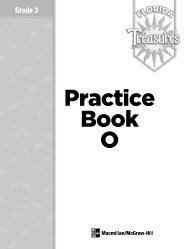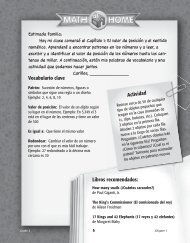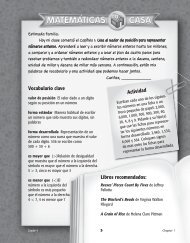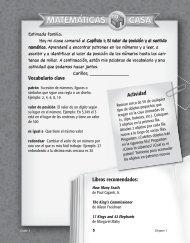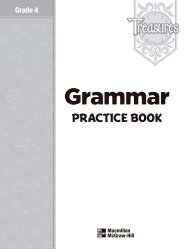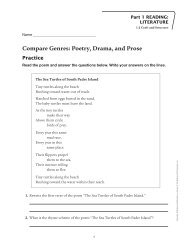Practice - Macmillan/McGraw-Hill
Practice - Macmillan/McGraw-Hill
Practice - Macmillan/McGraw-Hill
You also want an ePaper? Increase the reach of your titles
YUMPU automatically turns print PDFs into web optimized ePapers that Google loves.
Name<br />
Suffixes are word parts added to the ends of base words to<br />
change their meanings or their parts of speech.<br />
• The suffix -ity means “the state of.” For example, when you add<br />
the suffix -ity to visible, the word visibility means “the state of<br />
being visible.”<br />
• The suffix -ion means “act or process.” When you add -ion<br />
to demonstrate, the word demonstration means “the act of<br />
demonstrating.”<br />
• The suffix -ous means “having the qualities of.” For example,<br />
when you add -ous to the word poison, the word poisonous<br />
means “having the qualities of poison.”<br />
<strong>Practice</strong><br />
Vocabulary Strategy:<br />
Suffixes<br />
In each sentence, underline the word that includes the suffix<br />
-ity, -ion, or -ous. Then write each word and its meaning. Remember<br />
that there may be spelling changes when you add the suffix.<br />
1. The mischievous girl liked to play tricks on her sisters.<br />
2. Amalia has the ability to make friends easily.<br />
3. With no hesitation, the boy loudly declared, “I want to go, too!”<br />
4. Juan was suspicious of his younger brother when the last cookie<br />
disappeared.<br />
5. Our Spanish teacher always makes us work on our pronunciation.<br />
64<br />
The Night of San Juan<br />
Grade 5/Unit 2<br />
At Home: Write three sentences about a trip, using words that<br />
end in -ity, -ion, or -ous.<br />
© <strong>Macmillan</strong>/<strong>McGraw</strong>-<strong>Hill</strong>



